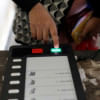Army may not be given power of arrest
The army is unlikely to get back the power to arrest anyone for violating electoral laws on the polling day.
In its draft proposals to amend the Representation of Peoples' Order (RPO), an Election Commission committee did not include the armed forces in the definition of the law enforcement agency, sources at the EC secretariat said.
During recent talks with the EC on the next national polls, the majority of the 40 registered political parties demanded deployment of army with the power of arresting lawbreakers to maintain law and order.
If the armed forces are included in the definition of the law enforcement agencies, army personnel, just like the policemen, will have the power to arrest offenders on the polling day.
The armed forces were given the power before the 2008 parliamentary elections. The power was scrapped through amending the RPO in 2009.
The EC committee, headed by Election Commissioner Kabita Khanam, drafted 31 proposals, including introduction of Electronic Voting Machine (EVM) in the next Jatiya Sangsad elections, scheduled to be held in early 2019.
The proposals have been drafted based on the recommendations by political parties, civil society members, election officials and other stakeholders.
Once finalised, the proposals will be sent to the government to translate them into a law by amending the RPO.
During talks with the EC, the ruling Awami League placed proposals to introduce EVM and not to include the armed forces in the definition of law enforcement agency. But the BNP took an opposite stance on these two key issues.
Asked about inclusion of the armed forces in the definition of law enforcement agency, Kabita Khanam said, “Nothing has been finalised yet. We are just preparing the draft. We have to review all the aspects of the RPO. We have time in hand till February. So it doesn't mean that we are ruling it out. We will place our draft proposals before the commission to make the final decision.”
According to the draft report, the EC will form committee(s) for each constituency to monitor the election expenses of candidates.
“Every candidate shall submit weekly expenses report to the committee. The committee shall submit a weekly report to the Election Commission, including their findings,” the draft reads.
It also says the commission shall set up committee(s) for each constituency to carry out an audit on the election expenses.
“After submission of a return on the election expenses by the candidate's chief election agent, the committee will verify the expenditures and bill vouchers. The committee in a prescribed form will submit the verification report to the returning officer within 15 days after receiving the return on election expenditures.”
The draft report also proposed that the EC may appoint its own observer, from its own or government officials, for each constituency to know about the irregularities, law and order, any failure or negligence of law enforcement agencies and polling personnel and any failure, negligence, biasness or discriminatory attitude of the returning and assistant returning officers.
It said the commission may set up a “complaint redress centre” to resolve complaints promptly.
The EC committee also recommended introducing an online system for submitting nomination papers.
An independent candidate should submit a list of signatures of 1,000 voters of his constituency instead of signatures of one percent voters, the committee proposed.
Paying heed to most of the political parties' demand, the committee recommended raising the security deposit of a candidate from Tk 20,000 to Tk 50,000.
According to the draft, if two or more candidates bag the same number of votes, the commission shall direct the returning officer to conduct a re-election among them. Presently, a lottery is held among the candidates to pick the winner.
The committee further recommended that an early voting system might be introduced for the polling personnel and law enforcers who carry out duties during elections.

 For all latest news, follow The Daily Star's Google News channel.
For all latest news, follow The Daily Star's Google News channel. 








Comments